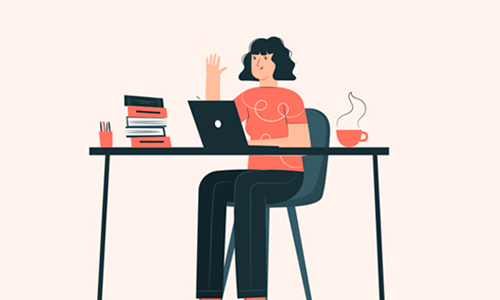

How to (not) get distracted while working from home.
Due to the current situation of Covid 19, many companies have started adopting the culture of Work From Home and that resulted in an increase in the productivity of work done by their employees.
That arouses a question in our mind, Why is that? Is working from home more comforting than working in the office? As one doesn’t have to listen to the constant murmuring of their colleagues around, no gossip sessions, Joey doesn’t have to share the lunch (that seriously is a relief!), not being stuck in traffic, hence saving on traveling time and getting to spend more time with your family and loved ones. (the biggest comfort, right?)
Paperclips, as an agency, from its inception, has always believed in the concept of “working from home.” We initially used to feel, it is a drawback to not have a dedicated work space but as the time passed, we realized it is our biggest advantage to work from home because (let’s all voluntarily agree) there’s no comfort and warmth like that of a home.
But the question still remains, how to increase your productivity? Because when at home, there’s leisure, procrastination, small breaks and most importantly there’s no schedule. Can say that, we also have been there and done that. How did we turn that around in our favor in order to increase our productivity? Here it goes…
“The key is not to prioritize what’s on your schedule, but to schedule your priorities.” — Stephen Covey, American educator, author and businessman.
Go back to your school.
Not literally, of course, but create a time table for yourself. In professional terms, a schedule. A sheet of the works that should be finished by EOD. Try to finish the same. Divide the schedule in three parts,
a) Pre Lunch work — A new day, fresh beginning. In the morning schedule, you can take up proficient work as your productivity is at its peak.
b) Post Lunch work — In this time, you can schedule your meetings with your colleagues or teammates.
c) Evening Work — You can finish what you’ve started in the morning. End of the day, end of the work.
As soon as you finish a particular work, update that in your schedule, so that you can measure your own efficiency.
2. Dedicate a space
Though there’s freedom to roam freely in home starting from the living room, bedroom in the afternoon and garden in the evening. Avoid juggling between different rooms. Dedicate a room or a corner specially for your work. Keep all your professional stuff at that place only. Decorate your desk just like you do it at your office.
3. Behave like a professional.
Organize your day just like your day in the office. Wake up at the same time, get dressed, have your beverages, fill your water bottle — this might sound funny but working exactly like how you work at office leaves you with no excuses for getting up again and again.
4. Avoid sweet distractions.
One more meme on Instagram, one more episode on Netflix, a quick chat with a friend; it’s difficult to avoid such sweet distractions.
Social media not only snatches your time, but also teaches you about attention deficiency. — Neeraj Agnihotri.
5. A proper time for breaks.
No breaks and only working, makes Jack a dull boy. Dedicate an hour break for relaxation. Take lunch, have a chat with your family or loved ones, take a quick nap, get yourself rejuvenated and start working again.
6. Keep your colleagues and/or team in the loop.
Share your progress with your team and colleagues. Keep them updated.
7. Balance your personal and professional life.
Don’t get so busy making a living that you forget to make a life. — Dolly Parton. When at home, balancing personal and professional life in itself is a task. It is very difficult to not get distracted by your family, friends or children. Prioritize your tasks. When you’re with family, no discussions of work. And when working, tell them not to bother you in your work timings.
8. Definite time to stop.
Don’t stretch yourself. Decide a specific time to stop. It is a general tendency to keep on working when at home but it is equally important to know when to stop. It’s 7! Shut down your system, switch off the lights and go back to your personal life. It’s family o’clock now. All of these things mentioned are easier said than done, we know. We won’t get results in one day, might as well not in a week but we can begin slowly by taking baby steps to increase our work productivity and efficiency.
“You see, in life, lots of people know what to do, but few people actually do what they know. Knowing is not enough! You must take action.” — Tony Robbins.


